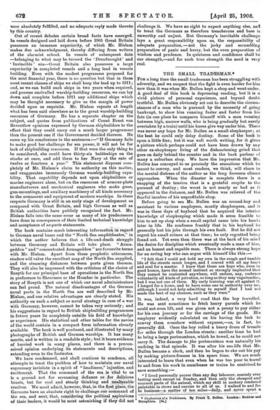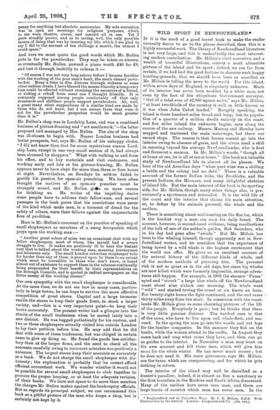THE SMALL TRADESMAN.*
FOR a long time the small tradesman has been struggling with adversity, and we suspect that the fight is even harder for him now than it was when Mr. Bullen kept a shop and went under. A good deal of this book is depressing reading, but it is a vivid picture of personal experience, and beyond doubt truthful. Mr. Bullen obviously set out to describe the circum- stances of a man who is pursued by the necessity of going bankrupt, to show him running faster and faster from his fate (in one place he compares himself with a man running between high, narrow walls, who is being gradually but surely overtaken by a train) until his knees give way under him. There was never any hope for Mr. Bullen as a small shopkeeper ; at the best he could only delay destiny. Some of the book is spun a little fine ; but it was well worth writing, for it gives a picture which perhaps could not have been drawn by any other ex-shopkeeper living of the disheartening grind that goes on daily behind the counter and in the back parlour oF many a suburban shop. We have the impression that Mr. Bullen has conveyed to us precisely the sensations which he meant to convey, and most readers, we think, will share in the mental distress of the author as the long foreseen climax approaches. When the disaster is complete there is a snapping of the tension that is a grateful respite to the pursued of destiny ; the worst is not nearly so bad as appeared in the distance, and Mr. Bullen was relieved of the fearful incubus of his unprofitable shop.
Before going to sea Mr. Bullen was an errand-boy and assistant to various employers, mostly shopkeepers, and it was in these days of boyhood that he acquired the interior knowledge of shopkeeping which made it seem feasible to him to set up shop when a small capital came into his hands later in life. He confesses frankly that in his boyhood lie generally lost his jobs through his own fault. But he did not regret his small crimes at that time ; he only regretted beim found out. Yet even then there was at the back of his mint the desire for discipline which eventually made a man of him, and an honest and capable man. There is always strong hope for an erring boy who can argue with himself like this
"I felt that I could not hold my own in the rough and tumble life of the streets much longer, and I craved with all my heart and soul for a master. I know that there are boys who, even in good homes, have the nomad instinct so strongly implanted that they cannot be contented anywhere, will endure, nay, embrace voluntarily all kinds of privation, so long as they may vagabondise, but I was not one of them. My early training was all against it. I longed for a home, and to have some one in authority over me, although I could not help admitting to myself that I had not made the best of my chances, such as they were."
It was, indeed, a very bard road that the boy travelled. He was sent sometimes to fetch heavy parcels which be could not even lift, and was given not a penny to pay either for his own journey or for the carriage of the goods. His. employer evidently calculated on his having the luck to convey them somehow without expense,—as, in fact, he generally did. Once the boy rolled a heavy drum of treacle. for miles through the London streets : another time be bad to bring a large portmanteau, which he towed, as he could not carry it. The damage to',the portmanteau was naturally his undoing in that episode. It was after his sea-life that Mr.. Bullen became a clerk, and then he began to eke out his pay by making picture-frames in his spare time. We are much interested to learn that even when he was too poor to travel' to and from his work in omnibuses or trains he contrived to save something :— " I lived personally poorer than any day labourer, scarcely ever tasting meat except on Sunday, and then only the cheapest and' coarsest parts of the animal, which my skill in cookery rendered. palatable in stews and curries to all of us. I walked to and fro to business—a matter of ten miles—daily, and never spent a
_ . .
* Confessios's of a TrUdinnan. By Frank T. Sullen. 'London: Hodder and Stoughton. [6e.]
penny for anything but absolute necessaries. My sole recreation was in open air meetings for religious purposes, which to me were theatre, circus, and concert all in one. Yet I grew steadily poorer, and as to saving, well, the only possible means of doing that was by insuring my life, which I am glad to say I did to the amount of ten shillings a month, the utmost I could spare."
And here we must quote the good words which Mr. Bullen puts in for the pawnbroker. They may be taken as sincere, as eventually Mr. Bullen pawned a piano worth £40 for £8, and lost it through inability to redeem it :— " Of course I was not very long ashore before I became familiar with the working of the poor man's bank, the much abused pawn- broker. Many a time in dire distress through sickness or some other sudden strain I have blessed the means whereby &temporary loan could be effected without straining the resources of a friend, or risking a rebuff from some one I thought friendly. It is commonly supposed among people comfortably off that only drunkards and shiftless people support pawnbrokers. Ah, well, a great many other suppositions of a similar kind are made by those who do not know, but I can assure them that were it not for the pawnbroker pauperism would be much greater than it is."
Mr. Bulien's shop was in Lordship Lane, and was a combined business of picture-framing and "art needlework,"—the latter proposed and managed by Mrs. Bullen. The site of the shop was ill-chosen to begin with. Nearer London business had better prospects, but, says Mr. Bullen of his unhappy choice, "I did not know then that for some mysterious reason Lord- ship Lane, except in one very small section of it, had always been shunned by shoppers." What with walking to and from his office, and to buy materials and visit customers, and working early and late at his picture-framing, Mr. Bullen appears never to have slept for more than three or four hours at night. Nevertheless, on Sundays he seldom failed to gratify his passion for open-air preaching. We have often thought the motives of an open-air preacher must .be strangely mixed, and Mr. Bullen &Os us more reason for thinking so. He writes of the impelling desire some people have to address their fellow-men, and several passages in the book prove that his convictions were never of the kind which make men, in a torment of dread for the safety of others, warn their fellows against the unquenchable fires of perdition.
Here is Mr. Bullen's comment on the practice of speaking of small shopkeepers as members of a smug bourgeoisie which preys upon the working man :— " Another great solace of mine was an occasional chat with my fellow shopkeepers, most of whom, like myself, had a severe struggle to live. It makes me positively ill to hear the blatant cant that is talked about the working man meaning journeymen and labourers only. The small London suburban shopkeeper toils far harder than any of them, is preyed upon by them to an extent which must be incredible to those who don't know, is taxed almost out of existence to support them in the schemes continually being propounded for their benefit by their representatives on the Borough Councils, and is quoted in radical newspapers as the bitter enemy of the working classes."
Our own sympathy with the small shopkeeper is considerable. At the same time, we do not see how in many cases, particu- larly in large towns, he can hope to survive the more effective competition of great stores. Capital and a large turnover enable the stores to keep their goods fresh, to stock a larger variety, and—this is a very important point—to keep their books accurately. The present writer had a glimpse into the straits of the small tradesmen when he moved lately into a new district. He was begged pathetically for his custom, and two or three shopkeepers actually visited him outside London to lay their petition before him. He may add that he did deal with some of these tradesmen, but was obliged in certain cases to give up doing so. He found the goods less satisfac- tory than at the larger firms, and the need to check all the accounts carefully owing to recurrent mistakes was positively a nuisance. The largest stores keep their accounts as accurately as a bank. We do not charge the small shopkeeper with dis- honesty; the explanation is probably that he cannot afford efficient accountant work. We wonder whether it would not be possible for several small shopkeepers to club together to procure the proper keeping, or at least the adequate revision, of their books. We have not space to do more than mention the charges Mr. Bullen makes against the bankruptcy officials. But as regards its principal subject, we can recommend this book as a pitiful picture of the man who keeps a shop, but is certainly not kept by it.























































 Previous page
Previous page